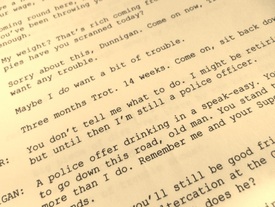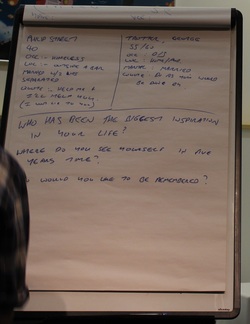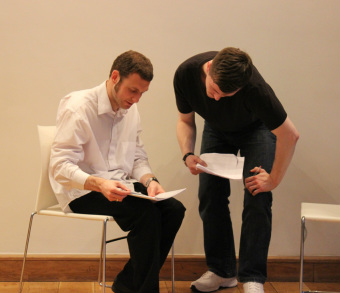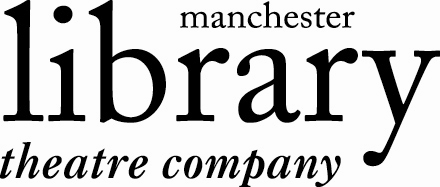This is a great character development exercise to practise once you’ve got the fundamentals out of the way and are looking to expand upon your character's deeper psychological profile. As well as being suitable for actors, I would recommend this to writers as well, as it can be very fruitful when trying to establish the motivations driving a character’s actions. First, I asked cast members to get into the mind-set of their characters. Then, one by one, they came up to the front of the rehearsal room and took a seat in the ‘therapist’s chair’. I played therapist and asked questions, making notes on what was being said so we could share and discuss the responses in more detail afterwards. The rules were that each individual session would last for a minimum of three minutes, during which they could say as much or as little as they liked. The key to creating detail (or rather ‘unlocking’ it) in this exercise is for the person playing therapist to ask questions which are as open-ended as possible, and encourage a long response, such as: ‘What’s on your mind?’ ‘What’s brought you here today?’ etc. And the fewer questions asked, the better. To break the silence, the character will often dig deeper for something to say, and uncover even more information about themselves. Sometimes, asking a question you don’t necessarily need to can interrupt this process. When you hit upon a certain point of interest, it’s good to get the characters to expand on that with other questions such as: ‘Why do you think that is?’ ‘And do you do or say X because you enjoy it or because you feel like you have to?’ The responses were incredibly useful for the cast in determining why their creations act the way they do, but also for me, who at this point was still in the process of writing the script. Without giving too much away, here are a few snippets of what was discussed: Marrielle at first gushed about how her fiancé was never home and always putting work first, but the deeper issue was of course the professional life she’d given up for him, along with her depleted feelings of self-worth and independence. Chubb talked about the how his apparent nonchalance was his way of exerting power, and how he was scared of losing ground with another character now that he had some competition. Spud was his usual chatty self, and (although you got the impression throughout that not all of what he was saying was entirely true) behind his actions was a survival instinct brought on by a hard upbringing, and the tragic death of a close relative. Underneath Street’s scammery was a desperate desire to be good. Behind Honest's dedication to his job was a desire to do right by his future wife, and to have a positive impact on the professional lives of those working underneath him. From the start, Dunnigan looked to take control of the doctor-patient dynamic, as you would expect him to, by only answering the questions he wanted to answer. And while Culler did open up a little, she was wary of showing any sort of emotion, and didn’t want to go into much detail. (And that’s all I can say without spoiling anything.) If you still haven’t bought your ticket for Honest yet, you can do so here.
As we’ve mentioned, to develop their creations, LTCC members have been taking part in a number of physical exercises to help them realise the finer details of their characters – how they walk, how they talk, and how they react to other people.
When group members had the basics of their characters down, but needed to develop the finer specifics, one such exercise which Rosie came up with was the (what I’m going to call) ‘Mimic and Exaggerate’ exercise.
For this, Rosie got workshop members warmed up, and then asked them to move around the rehearsal room, making use of all the space and changing direction when necessary.
Then, without disrupting their journeys, she asked workshop members to pick out someone else in the room at random. She then asked the cast to look at how this other person was walking, and gradually start to mimic it.
After a couple of minutes practicing this mimicked walk, Rosie then told them to gradually ramp it up, and really begin to exaggerate the walk they were simulating.
The walks became more severe and outlandish, and as workshop members moved around in this fashion, Rosie asked them to think about how a person using this walk would think. What kind of personality would they have? How would they talk? Group members, still walking, were given a couple of minutes to think about this.
Rosie then explained that, when she gave the signal, everyone would stop and start talking at the person closest to them, in the manner of this new character they had just developed.
The resulting responses were wide-ranging, and all very entertaining. Some of these new characters spoke in a relaxed manner, while others were uptight, some calculated, and some flustered.
After a few seconds, group members were set off walking again. Soon, they would be stopped again for a conversation, only this time they were told to imagine that the person nearest to them was their idol, or a famous celebrity.
Again, the results were varied – while some played it cool, others were flabbergasted and nervous, and tripping over their own words.
Thirty seconds later, they were set off walking again. After a couple of minutes, they would be asked to stop again, but this time imagining that the person nearest to them was someone from their past who they had something to prove to, be it an ex-partner or someone from high school.
What was interesting about the response to this part of the task, was not only the manner in which people talked, but the varying content of what they said. When stopped, some played the false superiority game, making up obvious lies about all their achievements – but others were surprisingly passive, being honest about their failings and turning inwards during the conversation.
What this exercise really demonstrated was how to get into the mind of a character, and let the mentality of that character lead the way in creating an actor’s response to a situation. The process really helped group members to think on their feet, and actually BE their creation in a given situation – and so none of the results felt forced, they all felt natural.
After completing this exercise, Rosie asked group members to think about how the characters they were developing might react in the situations above – would they play it cool? Or be flustered? Or make up a host of lies?
 Having spent a number of weeks developing 10 very unique characters, it was time for us to start working out how these characters would fit together in a story arc.
Putting together the script was always going to be an experimental process, and introduce everyone involved to new ways of working. From the start, our aim was to end up with a script which was entirely cast-responsive, and tailored to accentuate the acting styles of each group member – and I think this is something which we, collaborating as a group, have definitely achieved.
Furthermore, I dare say that going through this process has made the script much easier to write. Many people say that dialogue is easier to do when you’re writing it ‘for someone’ as opposed to an as-yet-uncast-role or a blank entity – and, for me, Honest has certainly proved this.
So, this is how we did it:
Once the cast members had gotten to grips with how their characters walked and talked, we started putting them together in improvised settings, to see how they bounced off each other. I watched, and made notes. Seeing how these relationships and dynamics worked enabled me to start thinking about dialogue which reflected the strengths of the actors.
This process of improvisation also helped in terms of the plot – rather than wondering what a character might do or say in a given situation, the cast were already showing me their characters' modus operandi via these exercises.
An important aspect of scriptwriting is obviously getting the language and the tone right. So, we placed some written materials up on a board and got the cast members to read them out in character.
One such piece of material was a complaint letter. As cast members read out the letter, even though the substance of what they were saying remained the same, the meaning of it was entirely different each time, due to the differing attitudes and emotional state of each character. What we ended up with was the same story of a complaint, but related in nine very different ways.
Another piece of material was a random page of dialogue, taken from an old play I’ve had sitting on my desktop for years. We got the cast members together in pairs, and got them to read it out. Again, even though the lines in this case weren’t meant specifically for the actors, this exercise gave us an idea of how our characters related to other, through the delivery of the lines, but also through their body language (be it warm, open, hostile, distant, etc).
Now I knew what each character sounded like, I produced a loose plot outline and skeleton version of the script. As the weeks passed, the script changed numerous times as cast members came up with more material for their characters’ pasts, and scribbled these materials in their character bibles. These little facts and characteristics were discussed with the rest of the group, and worked into the dialogue wherever possible.
One particular internal monologue written by Steven (Honest), was so striking and heartfelt when he read it back to the group, that it appears in the script verbatim.
As the script became more fleshed out through edits and re-writes, it then became a simple case of fine-tuning – in read-throughs, we encouraged cast members to bring up lines which they felt stuck in their throat or didn’t feel right, and worked out alternatives.
So, with a final script in place, then came the hard part – learning it! As well covering our character exercises on this blog, we’ll also be covering the exercises we’re using in rehearsals to improve delivery, technique, and memory, so stay tuned.
 So our production is just one month away, and now that we’ve established our characters and our script, we've gotten down to the serious business of rehearsing. We’ll be going over our rehearsal techniques in more detail over the coming weeks – but first, allow us to bring you up to speed with what we’ve done up until now.
When we began planning this project in January, we knew we wanted to build on our cast members’ character development skills, and give them the space to create intriguing fictional personalities of their own.
We also knew we wanted to produce something which was a logical step forward from our previous productions. Last year, our work was fairly location centric, and explored the city of Manchester as a kind of personality.
So we decided that with this production, we were going to keep the city setting, but make it less Manchester specific, and more anonymous. Something Rosie and I also agreed upon was that a night-time setting would be the best fit for it, as it’s usually the darker hours which tend to bring out the real eccentricity in characters.
And from there, our setting was born: a naïve character, accustomed to the workings of the day time, finds themselves stranded in an unfamiliar city in the middle of the night. To get home, they have to navigate their way through a labyrinth of weird and diverse characters – an urban, modernised Alice in Wonderland if you like.
With our setting decided on, over the next few months our workshops at LTCC revolved around establishing the real focus of the play – the characters.
We started off by canvassing the group and asking ourselves as individuals who our favourite characters are – be they fictional or real – and why. The answers were varied and diverse, ranging from Lara Croft to Eric Cantona, and from Jeff Bridges’ ‘The Dude’ to Jay Gatsby.
Taking various aspects of these favourite characters into account, we then gave each cast member a role to fulfil in the play – a crooked policeman, an ethical conman, a vagrant – but we didn’t give them any detail. The specifics of their character would be up to them.
We then embarked on a series of exercises, involving both improvisation and careful thinking – the goal of which was to help cast members form and develop their characters’ personalities. To really bring their creations to life and make them believable, cast members worked hard to devise their characters’ pasts and ask themselves questions such as: What is my character’s attitude to life? Why is my character the way he/she is? What might have happened to them in their past to make them like this? (I'll be talking more about the specific exercises we used to aid this process in the coming weeks.)
Once they had the basics of their creations down, cast members developed ‘character bibles’. They carried these notebooks with them at all times, scribbling down any thoughts relating to their characters, be it an important life event, a specific attitude to life, or even an internal monologue. Each week, cast members shared and discussed their thoughts, and it wasn’t long before all the characters in the group became incredibly fleshed out and well-acquainted with each other.
We were then in a very strong position creatively – we had 10 deep, well developed characters, all with their own goals and needs in life. All that needed to be done then was to work out how they felt about each other, and slot them together - a process which I’ll be talking about in part 2.
 WELCOME TO THE LIBRARY THEATRE COMMUNITY COMPANY BLOG!
LTCC IS A WORKSHOP-LED COLLECTIVE, RUN BY THE LIBRARY THEATRE COMPANY IN MANCHESTER CITY CENTRE.
HERE YOU’LL FIND INFORMATION ABOUT THE PROJECTS WE’RE WORKING ON, AND THE PRACTICES WE USE IN BRINGING OUR WORK TO LIFE ON STAGE.
WE ARE CURRENTLY PREPARING FOR OUR NEXT PRODUCTION, HONEST, WHICH IS BEING STAGED IN JULY AT THE INTERNATIONAL ANTHONY BURGESS FOUNDATION. THE PIECE FEATURES AN ENSEMBLE OF CHARACTERS DEVELOPED BY LTCC MEMBERS THROUGH GROUP AND INDIVIDUAL EXERCISES.
DURING THE RUN UP TO THE SHOW, WE’LL BE POSTING DIARY UPDATES AND PHOTOS FROM HONEST REHEARSAL SESSIONS, AND EXPLAINING THE KIND OF TECHNIQUES AND EXERCISES WE USE AT LTCC TO PREPARE FOR OUR PERFORMANCES. WE’LL ALSO BE POSTING INTERVIEWS WITH THE CAST OF HONEST, BOTH IN AND OUT OF CHARACTER, AND VARIOUS OTHER ITEMS TO PROVIDE AN INSIGHT INTO HOW THE PRODUCTION HAS BEEN CREATED.
SO, BE SURE TO CHECK BACK SOON FOR MORE!
IF YOU’RE INTERESTED IN JOINING LTCC, WE WANT TO HEAR FROM YOU. WE GENERALLY TAKE ON NEW MEMBERS DURING JANUARY/FEBRUARY AND SEPTEMBER/OCTOBER EACH YEAR – BUT ON OCCASION WE CAN BE FLEXIBLE AND ACCEPT NEW STARTERS OUTSIDE THESE MONTHS. CLICK ON THE GET INVOLVED TAB ON THE NAVIGATION BAR FOR MORE INFO.
|





 RSS Feed
RSS Feed